Charles E W Bean, Diaries, AWM38 3DRL 606/226/1 - Folder - Part 10
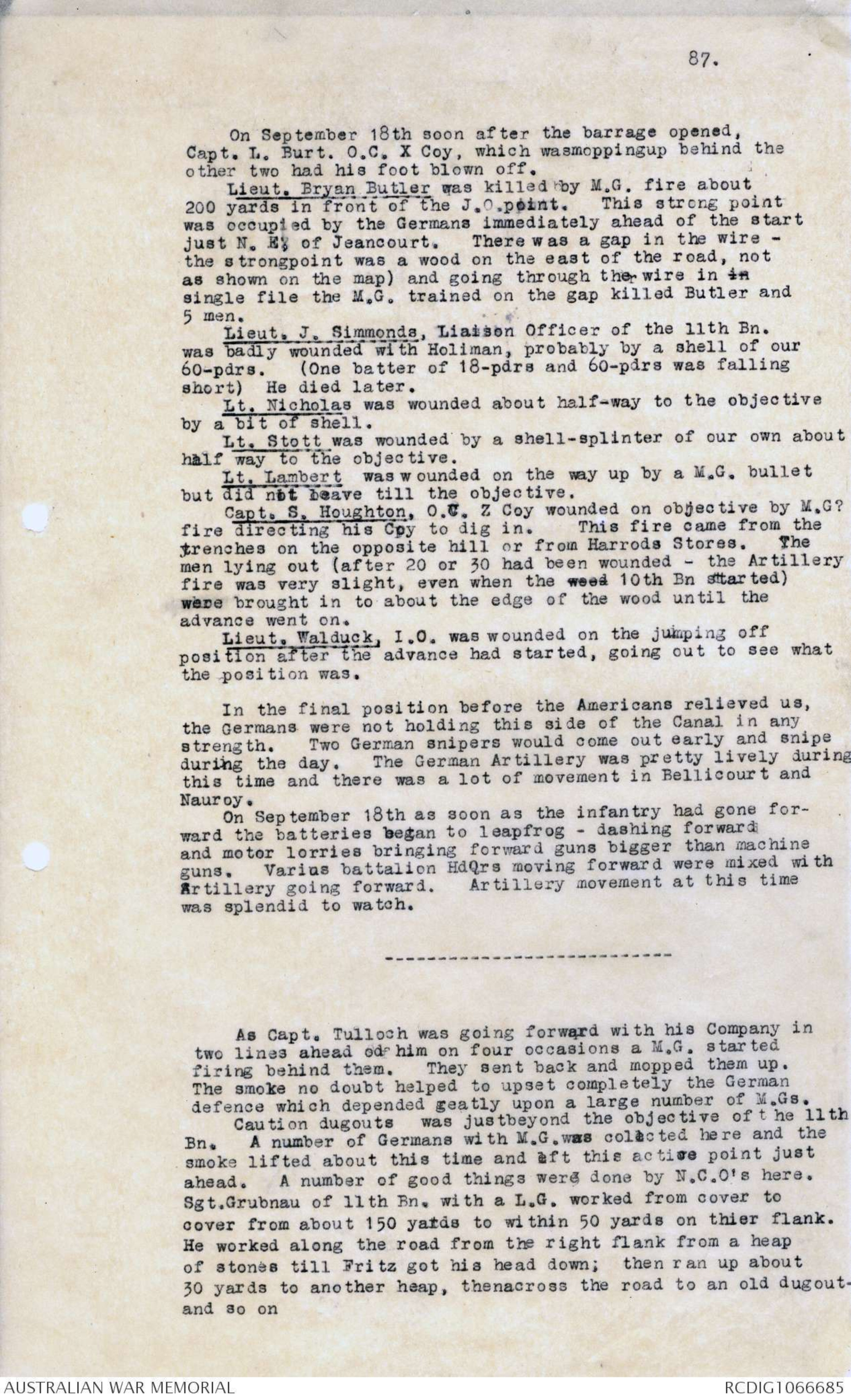
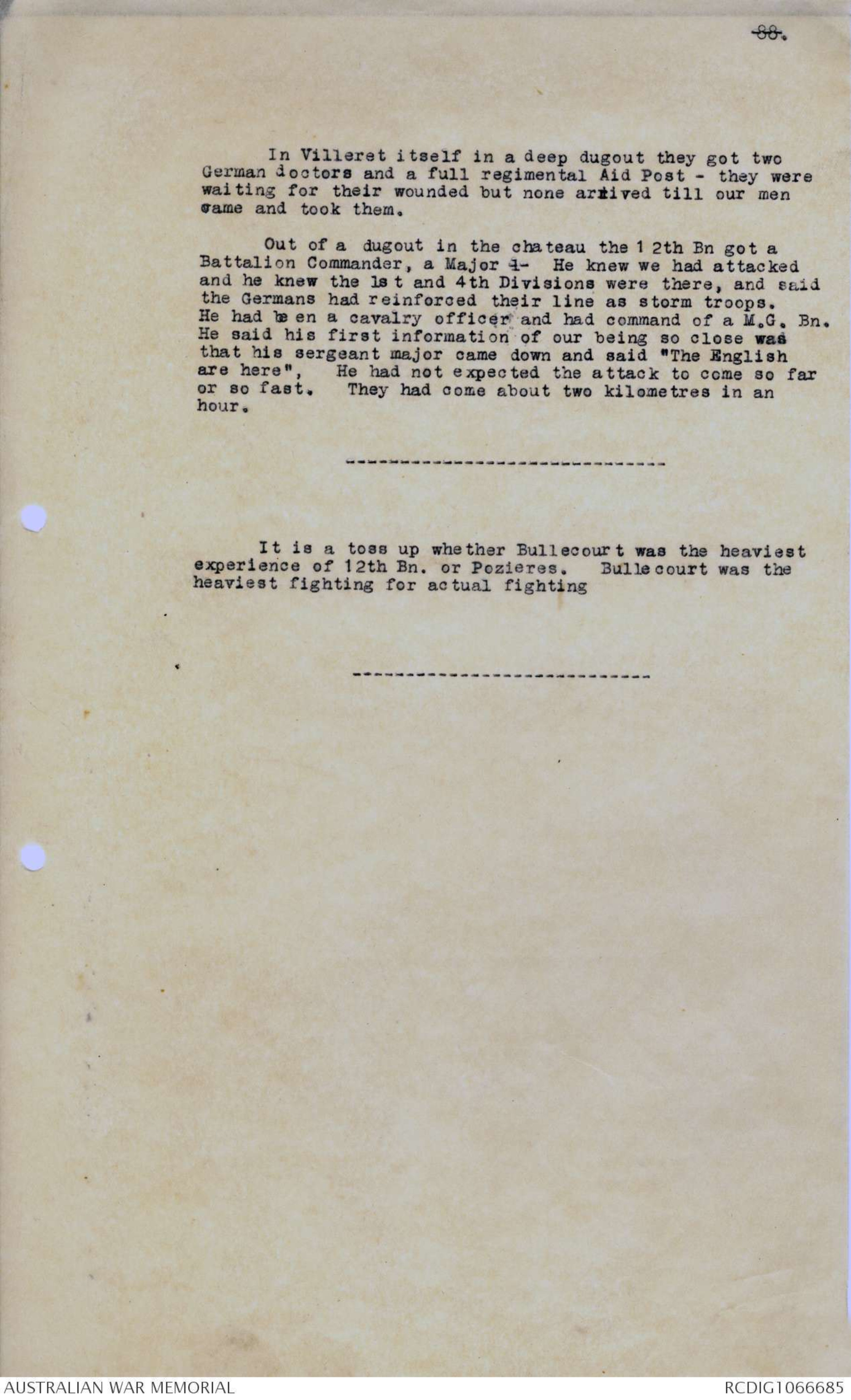
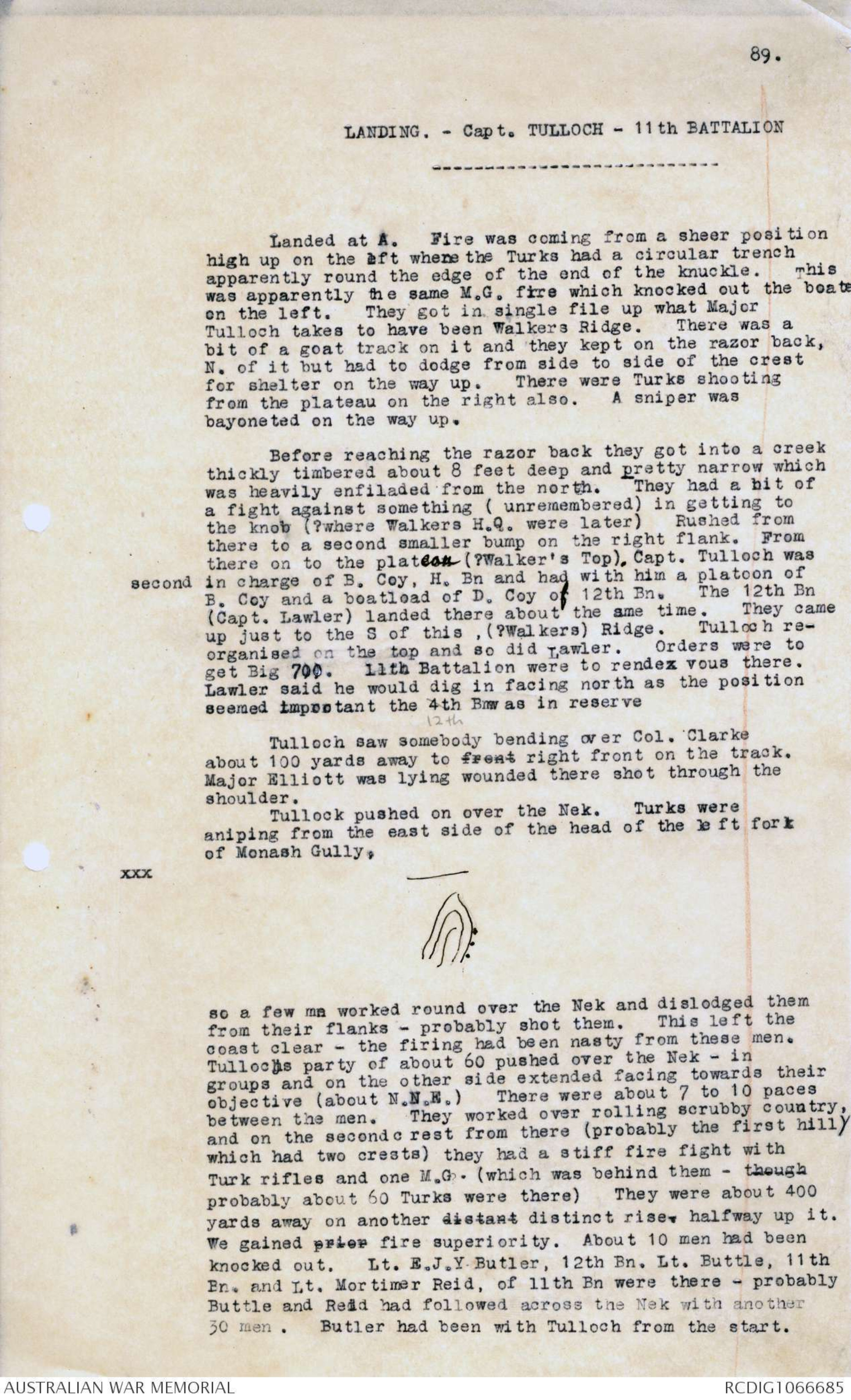
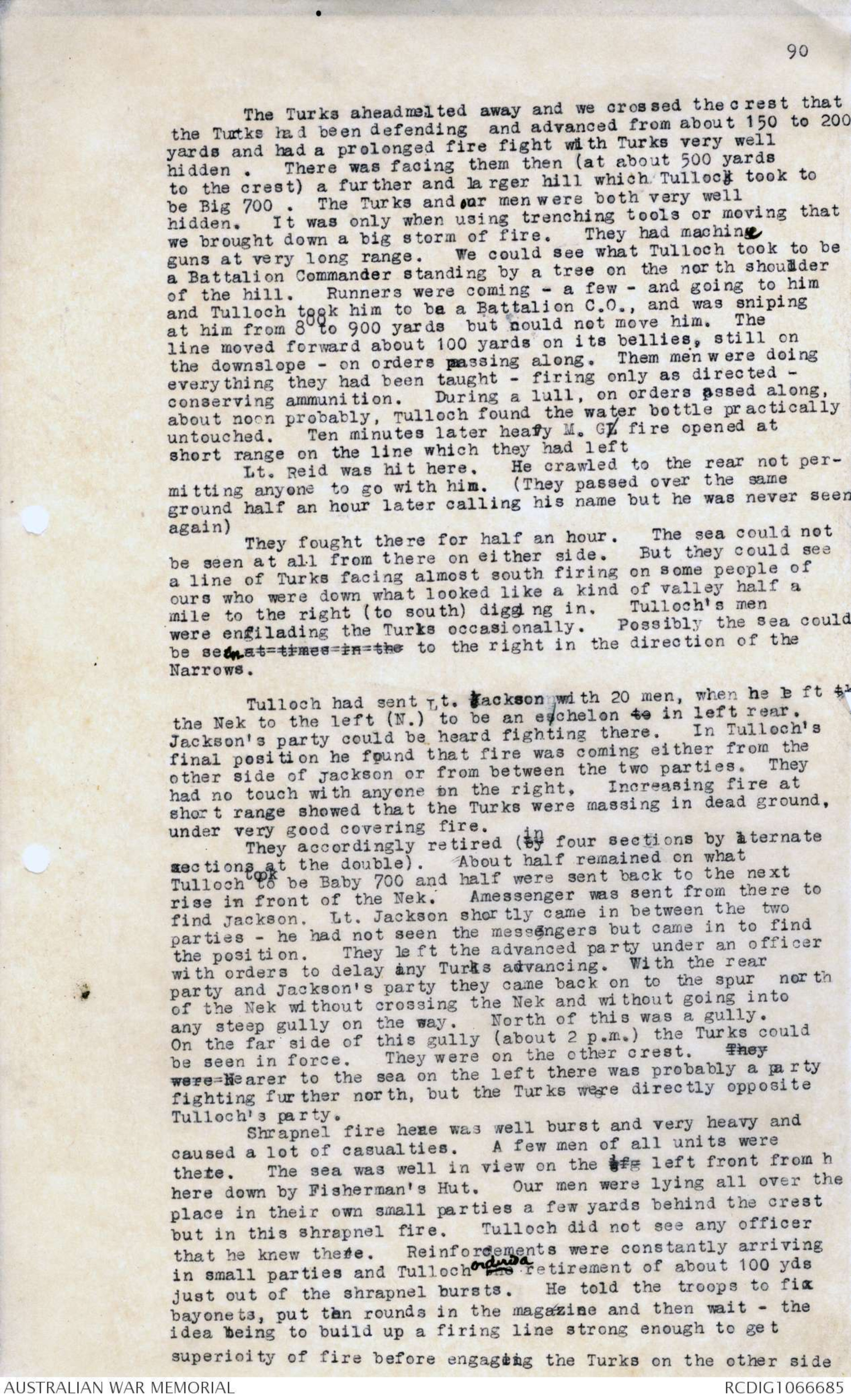

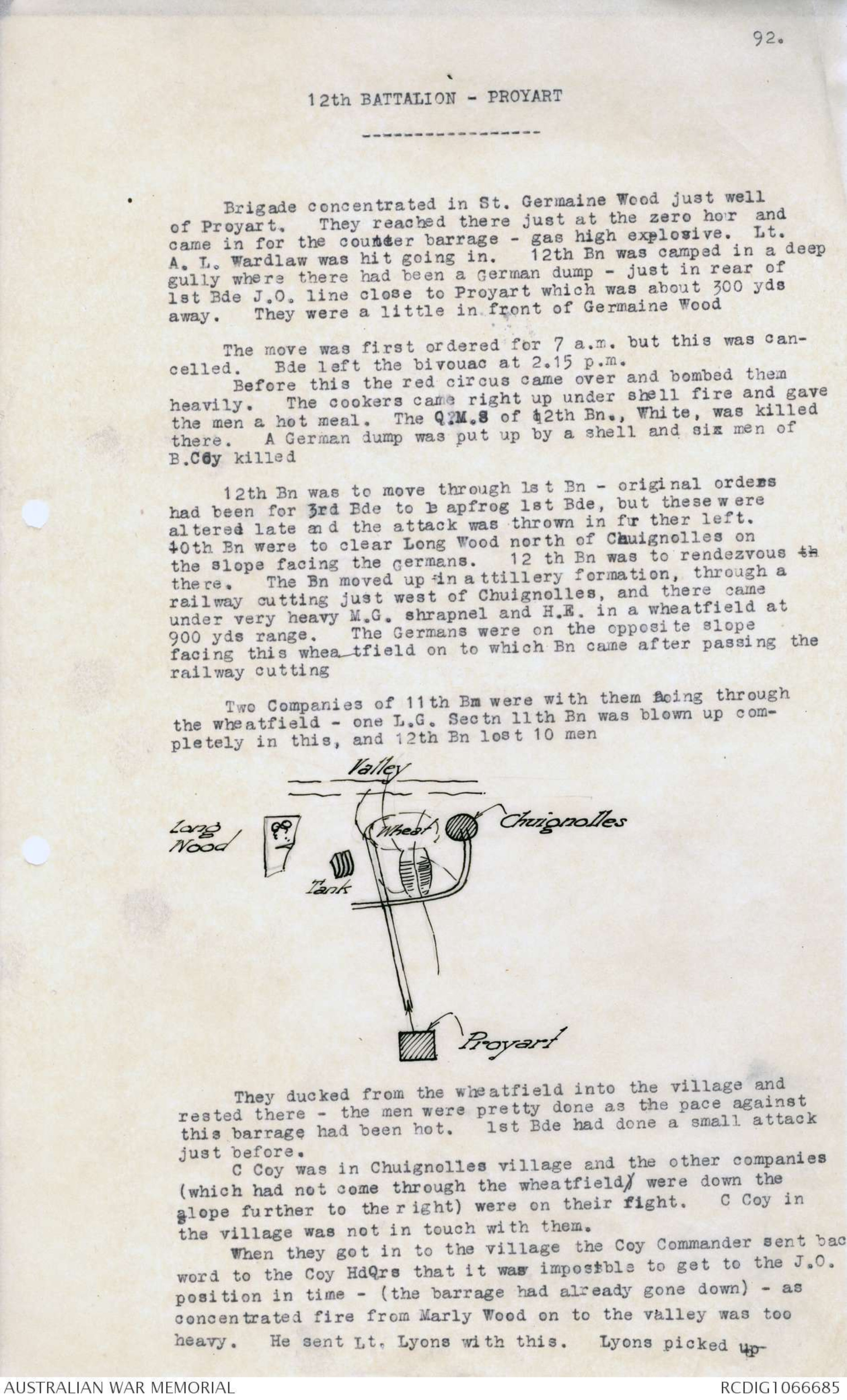
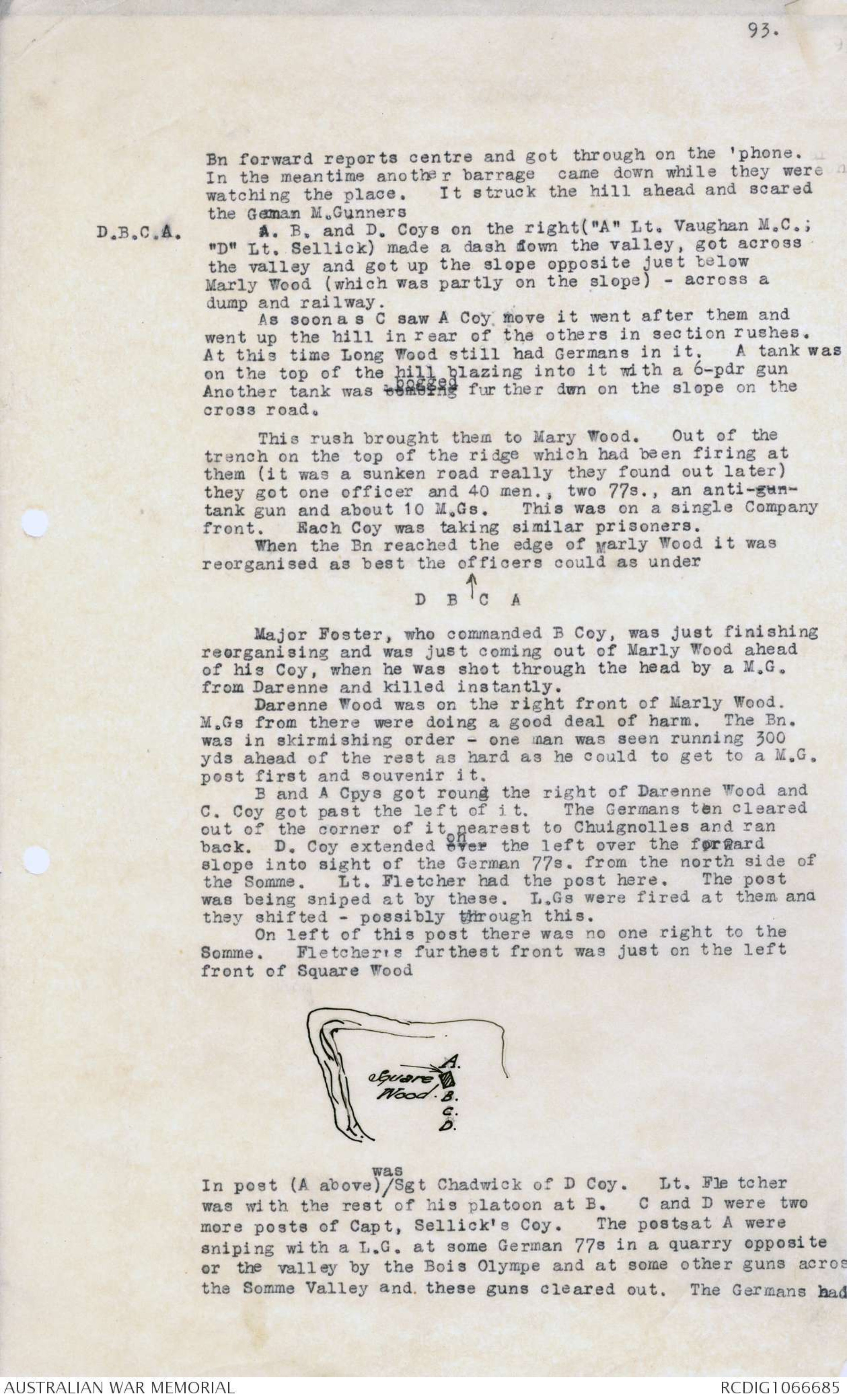
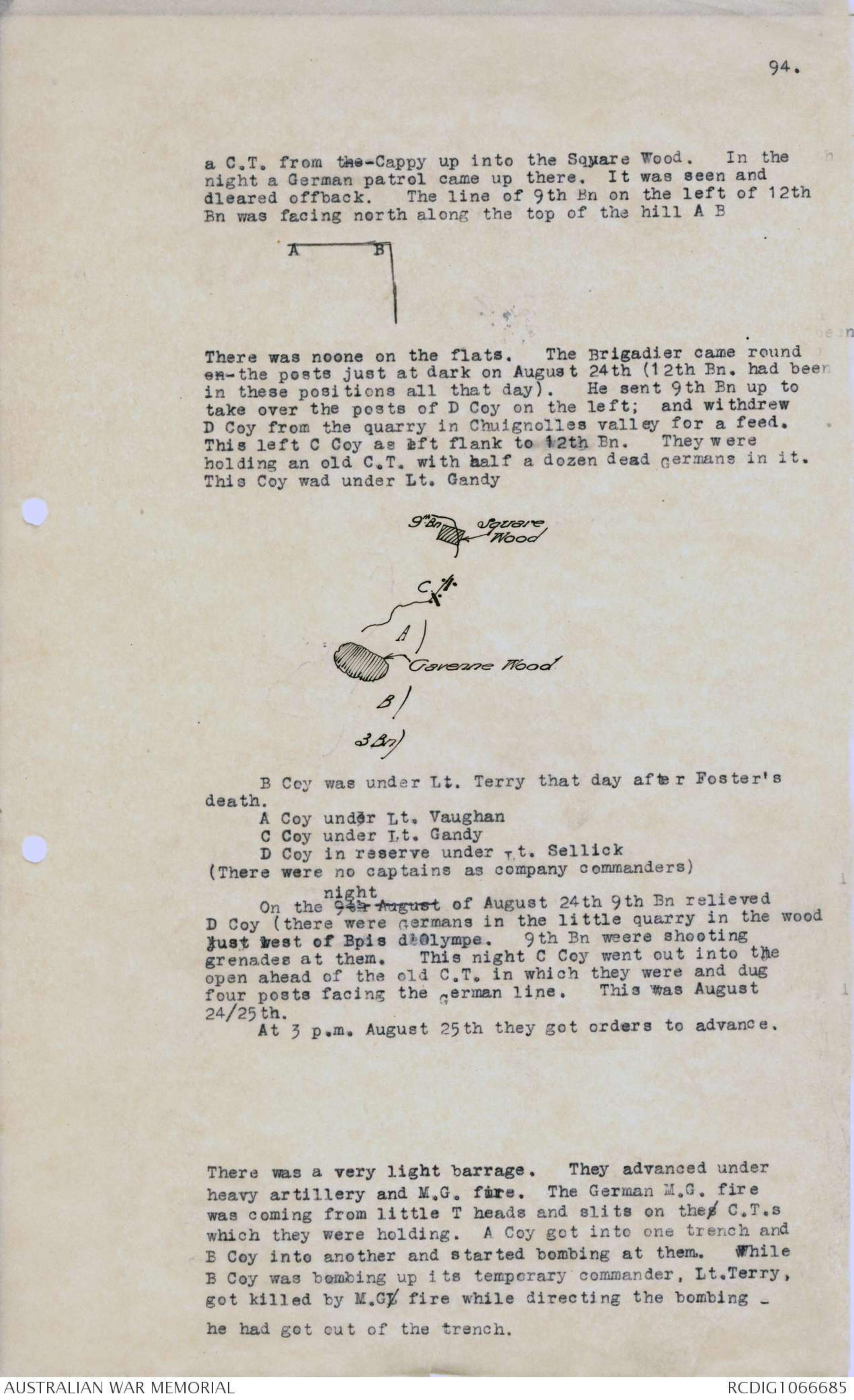
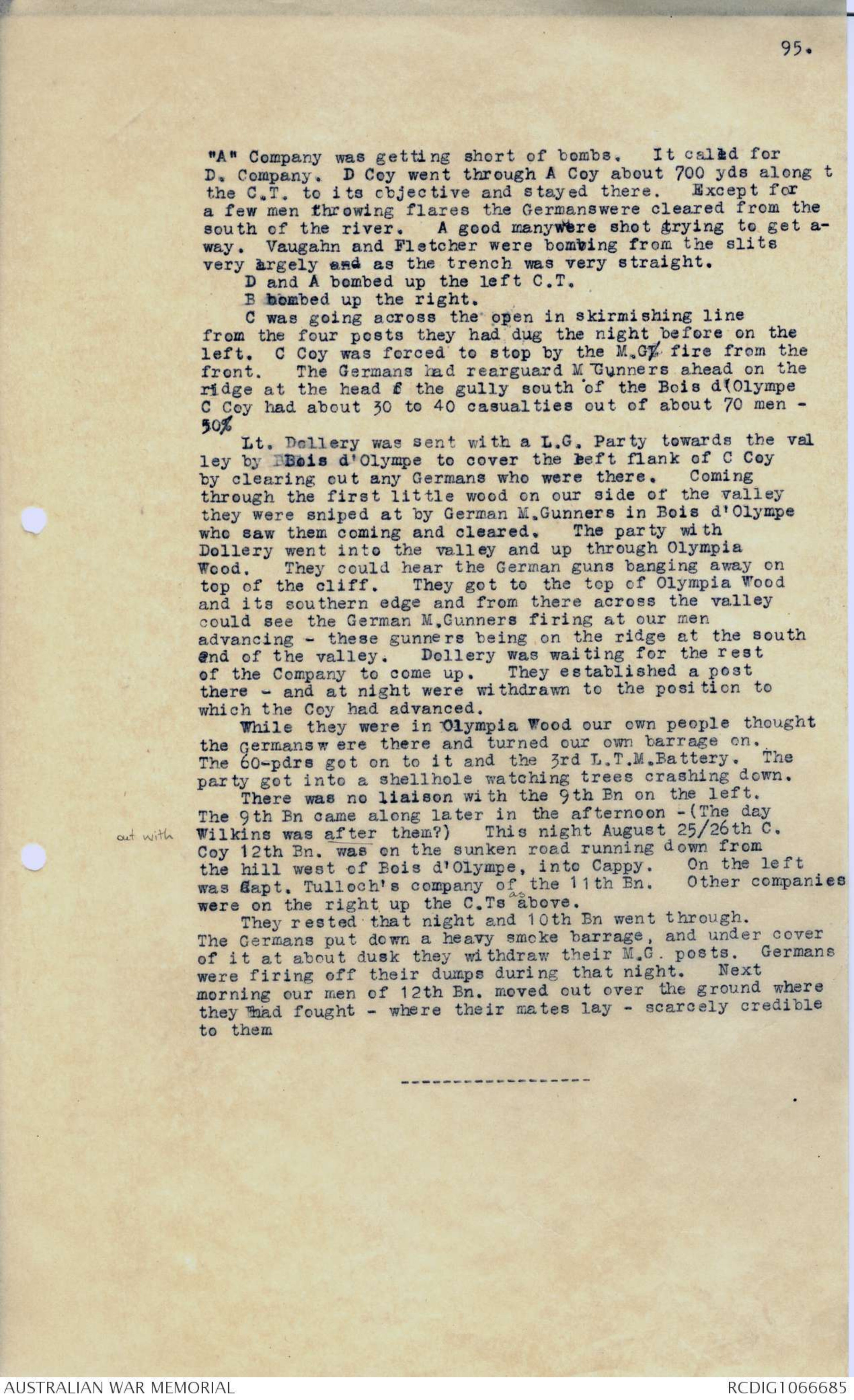
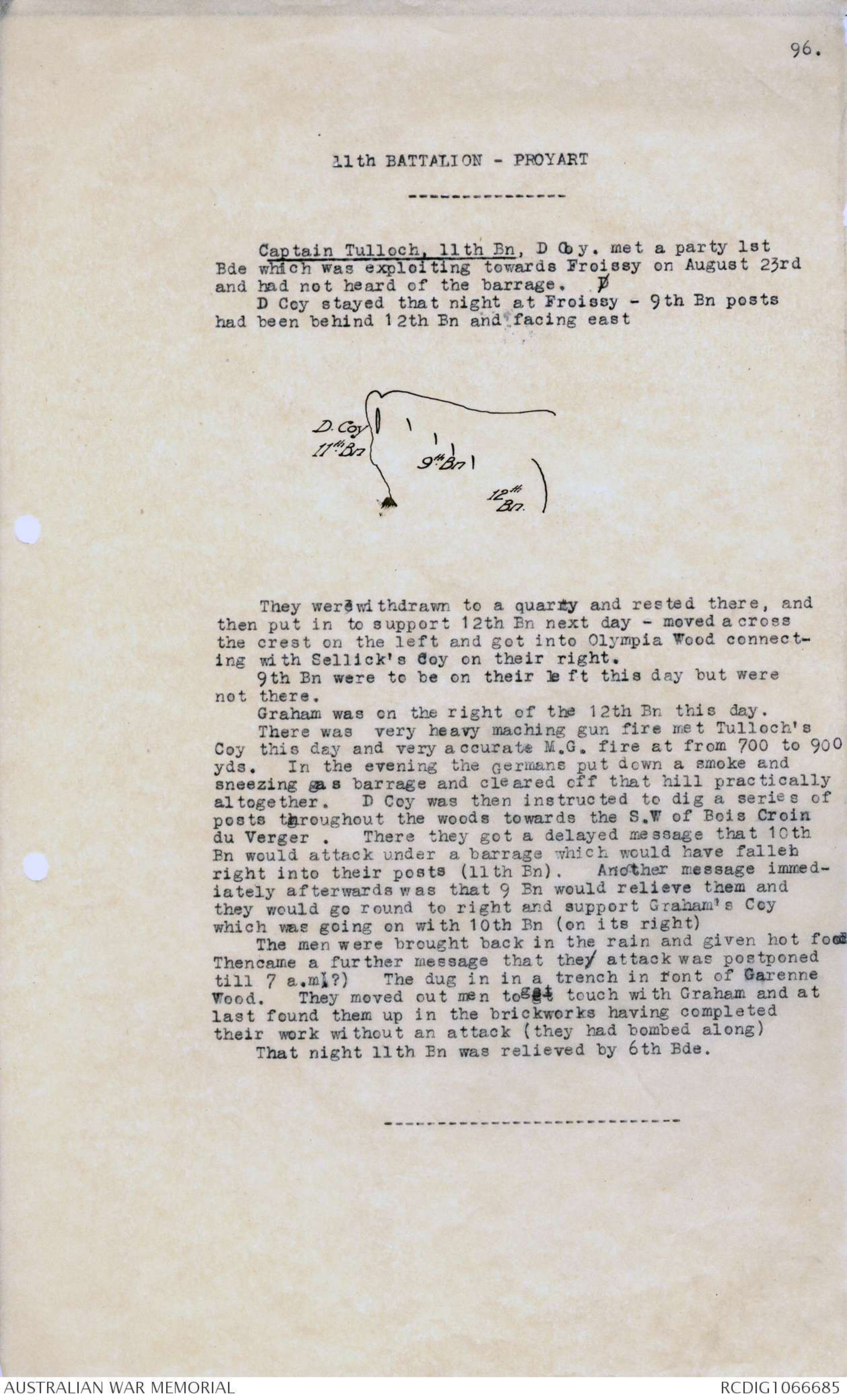
87.
On September 18th soon after the barrage opened,
Capt. L. Burt. O.C. X Coy, which wasmoppingup behind the
other two had his foot blown off.
Lieut. Bryan Butler was killed by M.G. fire about
200 yards in front of the J.0.point. This strong point
was occupied by the Germans immediately ahead of the start
just N. E. of Jeancourt. There was a gap in the wire -
the strongpoint was a wood on the east of the road, not
as shown on the map) and going through the wire in in
single file the M.G. trained on the gap killed Butler and
5 men.
Lieut. J. Simmonds, Liaison Officer of the 11th Bn.
was badly wounded with Holiman, probably by a shell of our
60-pdrs. (One batter of 18-pdrs and 60-pdrs was falling
short) He died later.
Lt. Nicholas was wounded about half-way to the objective
by a bit of shell.
Lt. Stott was wounded by a shell-splinter of our own about
half way to the objective.
Lt. Lambert was wounded on the way up by a M.G. bullet
but did not leave till the objective.
Capt. S. Houghton, O.C. Z Coy wounded on objective by M.G?
fire directing his Coy to dig in. This fire came from the
trenches on the opposite hill or from Harrods Stores. The
men lying out (after 20 or 30 had been wounded - the Artillery
fire was very slight, even when the weed 10th Bn started)
were brought in to about the edge of the wood until the
advance went on.
Lieut. Walduck, I.O. was wounded on the jumping off
position after the advance had started, going out to see what
the position was.
In the final position before the Americans relieved us,
the Germans were not holding this side of the Canal in any
strength. Two German snipers would come out early and snipe
during the day. The German Artillery was pretty lively during
this time and there was a lot of movement in Bellicourt and
Nauroy.
On September 18th as soon as the infantry had gone forward
the batteries began to leapfrog - dashing forward
and motor lorries bringing forward guns bigger than machine
guns. Varius battalion HdQrs moving forward were mixed with
Artillery going forward. Artillery movement at this time
was splendid to watch.
-------------
As Capt. Tulloch was going forward with his Company in
two lines ahead od him on four occasions a M.G. started
firing behind them. They sent back and mopped them up.
The smoke no doubt helped to upset completely the German
defence which depended geatly upon a large number of M.Gs
Caution dugouts, was justbeyond the objective of t he 11th
Bn. A number of Germans with M.G. was colected here and the
smoke lifted about this time and eft this active point just
ahead. A number of good things were done by N.C.O's here.
Sgt.Grubnau of 11th Bn. with a L.G. worked from cover to
cover from about 150 yards to within 50 yards on thier flank.
He worked along the road from the right flank from a heap
of stones till Fritz got his head down; then ran up about
30 yards to another heap, thenacross the road to an old dugout-
and so on
88.
In Villeret itself in a deep dugout they got two
German doctors and a full regimental Aid Post - they were
waiting for their wounded but none artived till our men
came and took them.
Out of a dugout in the chateau the 1 2th Bn got a
Battalion Commander, a Major 1- He knew we had attacked
and he knew the lst and 4th Divisions were there, and said
the Germans had reinforced their line as storm troops.
He had been a cavalry officer and had command of a M.G. Bn.
He said his first information of our being so close was
that his sergeant major came down and said "The English
are here", He had not expected the attack to come so far
or so fast. They had come about two kilometres in an
hour.
-------------------
It is a toss up whether Bullecourt was the heaviest
experience of 12th Bn. or Pozieres. Bullecourt was the
heaviest fighting for actual fighting
-------------------
89.
LANDING. - Capt. TULLOCH - 11th BATTALION
--------------------------
Landed at A. Fire was coming from a sheer position
high up on the eft where the Turks had a circular trench
apparently round the edge of the end of the knuckle. This
was apparently the same M.G. fire which knocked out the boats
on the left. They got in single file up what Major
Tulloch takes to have been Walkers Ridge. There was a
bit of a goat track on it and they kept on the razor back,
N. of it but had to dodge from side to side of the crest
for shelter on the way up. There were Turks shooting
from the plateau on the right also. A sniper was
bayoneted on the way up.
Before reaching the razor back they got into a creek
thickly timbered about 8 feet deep and pretty narrow which
was heavily enfiladed from the north. They had a bit of
a fight against something ( unremembered) in getting to
the knob (?where Walkers H.Q. were later) Rushed from
there to a second smaller bump on the right flank. From
there on to the platoon (?Walker's Top), Capt. Tulloch was
second in charge of B. Coy, H. Bn and had with him a platoon of
B. Coy and a boatload of D. Coy of 12th Bn. The 12th Bn
(Capt. Lawler) landed there about the ame time. They came
up just to the S of this, (?Walkers) Ridge. Tulloch reorganised
on the top and so did Lawler. Orders were to
get Big 700. 11th Battalion were to rendez vous there.
Lawler said he would dig in facing north as the position
seemed improtant the 4th 12th Bnw as in reserve
Tulloch saw somebody bending over Col. Clarke
about 100 yards away to front right front on the track.
Major Elliott was lying wounded there shot through the
shoulder.
Tullock pushed on over the Nek. Turks were
sniping from the east side of the head of the le ft fork
of Monash Gully,
xxx
hand drawn image - refer to original
so a few mn worked round over the Nek and dislodged them
from their flanks - probably shot them. This left the
coast clear - the firing had been nasty from these men.
Tullochs party of about 60 pushed over the Nek - in
groups and on the other side extended facing towards their
objective (about N.N.E.) There were about 7 to 10 paces
between the men. They worked over rolling scrubby country
and on the second c rest from there (probably the first hill)
which had two crests) they had a stiff fire fight with
Turk rifles and one M.G. (which was behind them - though
probably about 60 Turks were there) They were about 400
yards away on another distant distinct rise. halfway up it.
We gained prior fire superiority. About 10 men had been
knocked out. Lt. E.J.Y Butler, 12th Bn. Lt. Buttle, 11th
Bn. and Lt. Mortimer Reid, of 11th Bn were there - probably
Buttle and Reid had followed across the Nek with another
30 men. Butler had been with Tulloch from the start.
90
The Turks aheadmelted away and we crossed the crest that
the Turtks had been defending and advanced from about 150 to 200
yards and had a prolonged fire fight with Turks very well
hidden. There was facing them then (at about 500 yards
to the crest) a further and larger hill which Tulloch took to
be Big 700. The Turks and our men were both very well
hidden. It was only when using trenching tools or moving that
we brought down a big storm of fire. They had machine
guns at very long range. We could see what Tulloch took to be
a Battalion Commander standing by a tree on the north shoulder
of the hill. Runners were coming - a few - and going to him
and Tulloch tock him to be a Battalion C.O., and was sniping
at him from 800 to 900 yards but could not move him. The
line moved forward about 100 yards on its bellies, still on
the downslope - on orders passing along. Them men were doing
everything they had been taught - firing only as directed -
conserving ammunition. During a lull, on orders pssed along,
about noon probably, Tulloch found the water bottle practically
untouched. Ten minutes later heavy M. GL fire opened at
short range on the line which they had left
Lt. Reid was hit here. He crawled to the rear not permitting
anyone to go with him. (They passed over the same
ground half an hour later calling his name but he was never seer
again)
They fought there for half an hour. The sea could not
be seen at all from there on either side. But they could see
a line of Turks facing almost south firing on some people of
ours who were down what looked like a kind of valley half a
mile to the right (to south) digging in. Tulloch's men
were enfilading the Turks occasionally. Possibly the sea could
be seen at times in the to the right in the direction of the
Narrows.
Tulloch had sent Lt. Jackson with 20 men, when he le ft
the Nek to the left (N.) to be an eschelon to in left rear.
Jackson's party could be heard fighting there. In Tulloch's
final position he found that fire was coming either from the
other side of Jackson or from between the two parties. They
had no touch with anyone on the right, Increasing fire at
short range showed that the Turks were massing in dead ground,
under very good covering fire.
They accordingly retired (by^in four sections by aternate
sections at the double). About half remained on what
Tulloch ^took to be Baby 700 and half were sent back to the next
rise in front of the Nek. Amessenger was sent from there to
find Jackson. Lt. Jackson shortly came in between the two
parties - he had not seen the messengers but came in to find
the position. They left the advanced party under an officer
with orders to delay any Turks advancing. With the rear
party and Jackson's party they came back on to the spur north
of the Nek without crossing the Nek and without going into
any steep gully on the way. North of this was a gully.
On the far side of this gully (about 2 p.m.) the Turks could
be seen in force. They were on the other crest. Theywere Nearer to the sea on the left there was probably a party
fighting further north, but the Turks were directly opposite
Tulloch's party.
Shrapnel fire here was well burst and very heavy and
caused a lot of casualties. A few men of all units were
there. The sea was well in view on the efg left front from h
here down by Fisherman's Hut. Our men were lying all over the
place in their own small parties a few yards behind the crest
but in this shrapnel fire. Tulloch did not see any officer
that he knew there. Reinforcements were constantly arriving
in small parties and Tulloch who ^orderd a retirement of about 100 yds
just out of the shrapnel bursts. He told the troops to fix
bayonets, put ten rounds in the magazine and then wait - the
idea being to build up a firing line strong enough to get
superioity of fire before engagiig the Turks on the other side
91.
of the ravine. Staff officers down in the gully were
sending these reinforcements forward (? probably in
Shrapnel Gully). New Zealanders were coming on and some of
2nd Bde. Then Tulloch went forward to reconnoitre at the
edge of the ridge facing the Turks and was hit in the leg and
got back. When Tulloch got back to the position where he
was hit he heard of Lawler's death.
Tulloch met Evans in hospital in Alexandria: Talking
it over they decided that Evans was on his right in the advance
position but out of touch. The advanced position the men kept
touch splendidly and passed orders and information though there
was a gap of five yards between men. The party who were left
to delay the Turks on Baby 700 probably fought their own
action there.
In the advanced position they found the ground very
hard, and any attempt to show an entrenching tool brought
down heavy fire. There might be little 6 in. there pozzies
there but no more.
------------------------
92.
12th BATTALION - PROYART
------------------------
Brigade concentrated in St. Germaine Wood just well
of Proyart. They reached there just at the zero hor and
came in for the counter barrage - gas high explosive. Lt.
A. L. Wardlaw was hit going in. 12th Bn was camped in a deep
gully where there had been a German dump - just in rear of
1st Bde J.O. line close to Proyart which was about 300 yds
away. They were a little in front of Germaine Wood
The move was first ordered for 7 a.m. but this was cancelled.
Bde left the bivouac at 2.15 p.m.
Before this the red circus came over and bombed them
heavily. The cookers came right up under shell fire and gave
the men a hot meal. The Q.M.S of 42th Bn., White, was killed
there. A German dump was put up by a shell and six men of
B.Coy killed
12th Bn was to move through 1st Bn - original orders
had been for 3rd Bde to leapfrog 1st Bde, but these were
altered late and the attack was thrown in further left.
40th Bn were to clear Long Wood north of Chuignolles on
the slope facing the Germans. 12 th Bn was to rendezvous th
there. The Bn moved up in a ttillery formation, through a
railway cutting just west of Chuignolles, and there came
under very heavy M.G. shrapnel and H.E. in a wheatfield at
900 yds range. The Germans were on the opposite slope
facing this whea tfield on to which Bn came after passing the
railway cutting
Two Companies of 11th Bm were with them facing through
the wheatfield - one L.G. Sectn 11th Bn was blown up completely
in this, and 12th Bn lost 10 men
hand drawn image - refer to original
They ducked from the wheatfield into the village and
rested there - the men were pretty done as the pace against
this barrage had been hot. 1st Bde had done a small attack
just before.
C Coy was in Chuignolles village and the other companies
(which had not come through the wheatfield) were down the
slope further to the right) were on their fight. C Coy in
the village was not in touch with them.
When they got in to the village the Coy Commander sent back
word to the Coy HdQrs that it was impossble to get to the J.O.
position in time - (the barrage had already gone down) - as
concentrated fire from Marly Wood on to the valley was too
heavy. He sent Lt, Lyons with this. Lyons picked up
93.
Bn forward reports centre and got through on the 'phone.
In the meantime another barrage, came down while they were
watching the place. It struck the hill ahead and scared
the Geman M.Gunners
D.B.C.A. A. B. and D. Coys on the right ("A" Lt. Vaughan M.C.;
"D" Lt. Sellick) made a dash down the valley, got across
the valley and got up the slope opposite just below
Marly Wood (which was partly on the slope) - across a
dump and railway.
As soon as C saw A Coy move it went after them and
went up the hill in rear of the others in section rushes.
At this time Long Wood still had Germans in it. A tank was
on the top of the hill blazing into it with a 6-pdr gun
Another tank was bombing bogged fur ther dwn on the slope on the
cross road.
This rush brought them to Mary Wood. Out of the
trench on the top of the ridge which had been firing at
them (it was a sunken road really they found out later)
they got one officer and 40 men., two 77s., an anti-gun-
tank gun and about 10 M.Gs. This was on a single Company
front. Each Coy was taking similar prisoners.
When the Bn reached the edge of Marly Wood it was
reorganised as best the officers could as under
D B C A
Major Foster, who commanded B Coy, was just finishing
reorganising and was just coming out of Marly Wood ahead
of his Coy, when he was shot through the head by a M.G.
from Darenne and killed instantly.
Darenne Wood was on the right front of Marly Wood.
M.Gs from there were doing a good deal of harm. The Bn.
was in skirmishing order - one man was seen running 300
yds ahead of the rest as hard as he could to get to a M.G.
post first and souvenir it.
B and A Cpys got roung the right of Darenne Wood and
C. Coy got past the left of it. The Germans ten cleared
out of the corner of it nearest to Chuignolles and ran
back. D. Coy extended on over the left over the forward
slope into sight of the German 77s. from the north side of
the Somme. Lt. Fletcher had the post here. The post
was being sniped at by these. L.Gs were fired at them and
they shifted - possibly through this.
On left of this post there was no one right to the
Somme. Fletcher's furthest front was just on the left
front of Square Wood
hand drawn image - refer to original
In post (A above) ^was Sgt Chadwick of D Coy. Lt. Fletcher
was with the rest of his platoon at B. C and D were two
more posts of Capt, Sellick's Coy. The postsat A were
sniping with a L.C. at some German 77s in a quarry opposite
or the valley by the Bois Olympe and at some other guns across
the Somme Valley and these guns cleared out. The Germans had
94.
a C.T. from the-Cappy up into the Square Wood. In the
night a German patrol came up there. It was seen and
dleared offback. The line of 9th En on the left of 12th
Bn was facing north along the top of the hill A B
hand drawn image - refer to original
There was noone on the flats. The Brigadier came roundon-the posts just at dark on August 24th (12th Bn. had been
in these positions all that day). He sent 9th Bn up to
take over the posts of D Coy on the left; and withdrew
D Coy from the quarry in Chuignolles valley for a feed.
This left C Coy as left flank to 12th Bn. They were
holding an old C.T. with half a dozen dead Germans in it.
This Coy wad under Lt. Gandy
hand drawn image - refer to original
B Coy was under Lt. Terry that day after Foster's
death.
A Coy under Lt. Vaughan
C Coy under Lt. Gandy
D Coy in reserve under Lt. Sellick
(There were no captains as company commanders)
On the ^night 9th August of August 24th 9th Bn relieved
D Coy (there were Germans in the little quarry in the wood
just west of Bpis d'Olympe. 9th Bn were shooting
grenades at them. This night C Coy went out into the
open ahead of the old C.T. in which they were and dug
four posts facing the German line. This was August
24/25th.
At 3 p.m. August 25th they got orders to advance.
There was a very light barrage. They advanced under
heavy artillery and M.G. fire. The German M.G. fire
was coming from little T heads and slits on thes C.T.s
which they were holding. A Coy got into one trench and
B Coy into another and started bombing at them. While
B Coy was bombing up its temporary commander, Lt.Terry,
got killed by M.GL fire while directing the bombing -
he had got out of the trench.
95.
"A" Company was getting short of bombs. It caled for
D. Company. D Coy went through A Coy about 700 yds along t
the C.T. to its cbjective and stayed there. Except for
a few men throwing flares the Germanswere cleared from the
south of the river. A good manywere shot trying to get away.
Vaugahn and Fletcher were bombing from the slits
very largely and as the trench was very straight.
D and A bombed up the left C.T.
B bombed up the right.
C was going across the open in skirmishing line
from the four posts they had dug the night before on the
left. C Coy was forced to stop by the M.GL fire from the
front. The Germans had rearguard M Gunners ahead on the
ridge at the head f the gully south of the Bois d'Olympe
C Coy had about 30 to 40 casualties out of about 70 men -
50%
Lt. Dollery was sent with a L.G. Party towards the valley
by Bois d'Olympe to cover the reft flank of C Coy
by clearing cut any Germans who were there. Coming
through the first little wood on our side of the valley
they were sniped at by German M.Gunners in Bois d'Olympe
who saw them coming and cleared. The party with
Dollery went into the valley and up through Olympia
Wood. They could hear the German guns banging away on
top of the cliff. They got to the top of Olympia Wood
and its southern edge and from there across the valley
could see the German M.Gunners firing at our men
advancing - these gunners being on the ridge at the south
end of the valley. Dollery was waiting for the rest
of the Company to come up. They established a post
there - and at night were withdrawn to the position to
which the Coy had advanced.
While they were in Olympia Wood our own people thought
the Germans were there and turned our own barrage on.
The 60-pdrs got on to it and the 3rd L.T.M.Battery. The
party got into a shellhole watching trees crashing down.
There was no liaison with the 9th Bn on the left.
The 9th Bn came along later in the afternoon -(The day
[*out with*] Wilkins was after them?) This night August 25/26th C.
Coy 12th Bn, was on the sunken road running down from
the hill west of Bois d'Olympe, into Cappy. On the left
was Capt. Tulloch's company of the 11th Bn. Other companies
were on the right up the C.Ts ^as above.
They rested that night and 10th Bn went through.
The Germans put down a heavy smoke barrage, and under cover
of it at about dusk they withdraw their M.G. posts. Germans
were firing off their dumps during that night. Next
morning our men of 12th Bn, moved out over the ground where
they had fought - where their mates lay - scarcely credible
to them
-------------------
96.
11th BATTALION - PROYART
--------------
Captain Tulloch, 11th Bn, D Coy. met a party 1st
Bde which was exploiting towards Froissy on August 23rd
and had not heard of the barrage.
D Coy stayed that night at Froissy - 9th En posts
had been behind 12th Bn and facing east
hand drawn image - refer to original
They werewithdrawn to a quarry and rested there, and
then put in to support 12th Bn next day - moved across
the crest on the left and got into Olympia Wood connecting
with Sellick's Coy on their right.
9th Bn were to be on their left this day but were
not there.
Graham was on the right of the 12th Bn this day.
There was very heavy maching gun fire met Tulloch's
Coy this day and very accurate M.G. fire at from 700 to 900
yds. In the evening the Germans put down a smoke and
sneezing gas barrage and cleared off that hill practically
altogether. D Coy was then instructed to dig a series of
posts throughout the woods towards the S.W of Bois Croin
du Verger. There they got a delayed message that 10th
Bn would attack under a barrage which would have fallen
right into their posts (11th Bn). Another message immediately
afterwards was that 9 En would relieve them and
they would go round to right and support Graham's Coy
which was going on with 10th Bn (on its right)
The men were brought back in the rain and given hot food
Thencame a further message that they attack was postponed
till 7 a.m.?) The dug in in a trench in ront of Garenne
Wood. They moved out men to ^get touch with Graham and at
last found them up in the brickworks having completed
their work without an attack (they had bombed along)
That night 11th Bn was relieved by 6th Bde.
---------------------
 Sam scott
Sam scottThis transcription item is now locked to you for editing. To release the lock either Save your changes or Cancel.
This lock will be automatically released after 60 minutes of inactivity.